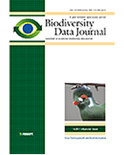
Biodiversity Data Journal
Scope & Guideline
Exploring the richness of life through rigorous scientific inquiry.
Introduction
Aims and Scopes
- Biodiversity Documentation:
The journal emphasizes the importance of documenting biodiversity through comprehensive checklists, species descriptions, and taxonomic revisions across various taxa, including plants, animals, fungi, and microorganisms. - Data Mobilization and Sharing:
It promotes the mobilization and sharing of biodiversity data, including occurrence records and genetic data, to enhance accessibility and usability for researchers and conservationists. - Applied Biodiversity Informatics:
The journal integrates biodiversity informatics with ecological research, focusing on the development and application of digital tools, databases, and methodologies for biodiversity analysis. - Conservation and Management:
Research published in the journal often addresses conservation strategies, highlighting the role of biodiversity data in informing management practices and policy decisions. - Citizen Science and Community Engagement:
The journal features studies that leverage citizen science initiatives to collect biodiversity data, fostering community involvement in biodiversity research and conservation.
Trending and Emerging
- Environmental DNA (eDNA) Studies:
There is a rising trend in the use of eDNA methodologies for biodiversity assessments, enabling researchers to detect species presence and diversity in various ecosystems without the need for physical specimens. - Integrative Taxonomy and Molecular Phylogenetics:
Recent publications increasingly emphasize integrative approaches that combine morphological, molecular, and ecological data to provide comprehensive insights into species relationships and biodiversity. - Impact of Climate Change on Biodiversity:
Research examining the effects of climate change on biodiversity patterns and species distributions is becoming more prevalent, highlighting the urgency of understanding these impacts for conservation efforts. - Citizen Science Initiatives:
There is a growing focus on citizen science projects that engage the public in biodiversity data collection, reflecting a trend towards collaborative research that enhances data availability and community involvement. - Biodiversity Informatics Tools and Databases:
The development and application of new tools, databases, and platforms for biodiversity data management and analysis are increasingly featured, showcasing advancements in biodiversity informatics.
Declining or Waning
- Traditional Taxonomy:
There has been a noticeable decline in traditional taxonomic studies, particularly those focusing solely on morphological descriptions without integrating molecular techniques or data analysis, as the field moves towards more integrative approaches. - Historical Biodiversity Studies:
Research that emphasizes historical biodiversity assessments without contemporary relevance or application is less frequently published, indicating a shift towards studies that offer immediate conservation implications. - Generalized Ecological Studies:
Publications that do not incorporate specific biodiversity data or do not focus on particular taxa or ecosystems are becoming less common, as the journal prioritizes more targeted research that contributes to biodiversity informatics.
Similar Journals
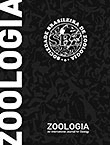
Zoologia
Fostering Collaboration for Wildlife ConservationZoologia, published by the SOC BRASILEIRA ZOOLOGIA and UNIV FEDERAL PARANA, is a premier open-access journal dedicated to the field of zoology and related disciplines. Established in 2009 and based in Brazil, this journal has quickly positioned itself as a vital resource for researchers, professionals, and students, providing a platform for innovative research and comprehensive reviews in animal science and zoology. With an H-index indicative of its growing citation impact and a current Scopus ranking placing it in the 46th percentile of its category, Zoologia focuses on increasing the visibility and accessibility of cutting-edge zoological research. The journal aims to advance the understanding of animal biology, ecology, and conservation, making it an essential read for those invested in animal science. As an open-access publication, it ensures that knowledge dissemination is unrestricted, fostering a collaborative scientific community striving towards impactful conservation and biodiversity initiatives.
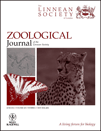
ZOOLOGICAL JOURNAL OF THE LINNEAN SOCIETY
Exploring the depths of animal science and ecology.Zoological Journal of the Linnean Society, published by Oxford University Press, stands as a prestigious vessel for scholarly discourse in the fields of Animal Science and Ecology. With an ISSN of 0024-4082 and E-ISSN 1096-3642, this journal has an illustrious history dating back to its inception in 1866, and has consistently contributed groundbreaking research that shapes our understanding of zoology and evolutionary biology. Operating out of the United Kingdom, the journal boasts an impressive Q1 ranking in both Animal Science and Zoology and Ecology, Evolution, Behavior and Systematics, positioning it among the top tier of its category. With a significant presence in the academic landscape, the journal ranks 24th among 490 in Animal Science and 97th among 721 in Ecology, reflecting its impact and relevance in the field. Although it is not an open access journal, the wealth of knowledge it offers is invaluable for researchers, professionals, and students alike, aiding in the advancement of zoological sciences.
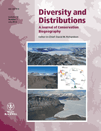
DIVERSITY AND DISTRIBUTIONS
Illuminating the pathways of evolution and ecology.DIVERSITY AND DISTRIBUTIONS is a leading journal in the field of ecology, evolution, and systematics, published by WILEY. With an impressive impact factor and designated as Q1 in its category for 2023, this journal ranks 49th out of 721 in the Scopus database, placing it in the top 93rd percentile among its peers. The journal has been committed to advancing knowledge since its inception in 1998 and has embraced Open Access since 2019, ensuring that research is accessible to a broad audience globally. By publishing high-quality, peer-reviewed articles that explore biodiversity patterns, conservation strategies, and ecological dynamics, DIVERSITY AND DISTRIBUTIONS plays a crucial role in fostering discussions that help to understand and mitigate global ecological challenges. Located in the United Kingdom, this journal serves a diverse community of researchers, professionals, and students, making significant contributions to science and policy regarding biodiversity and its distributions.
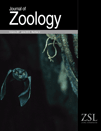
JOURNAL OF ZOOLOGY
Illuminating the intricate relationships of animal life.JOURNAL OF ZOOLOGY, published by Wiley, stands as a premier scholarly journal in the fields of Animal Science and Zoology, renowned for its outstanding contributions to the knowledge of animal biology and ecology. With an impressive impact factor and a strong ranking in the Q1 category for Animal Science and Zoology, as well as Q2 for Ecology, Evolution, Behavior, and Systematics, the journal rigorously engages with both foundational research and groundbreaking discoveries since its inception in 1830. Located in Hoboken, New Jersey, this journal is dedicated to fostering the academic community's understanding of zoological sciences, providing access to important research that shapes wildlife conservation efforts and ecological studies. Although the journal does not currently offer open access options, it continues to attract significant attention, as evidenced by its strong Scopus rankings in related categories. Researchers, professionals, and students will find invaluable resources in the JOURNAL OF ZOOLOGY to advance their understanding of animal life and the ecological challenges it faces today.
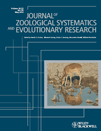
JOURNAL OF ZOOLOGICAL SYSTEMATICS AND EVOLUTIONARY RESEARCH
Unraveling Biodiversity Through Systematic ResearchThe Journal of Zoological Systematics and Evolutionary Research, published by Wiley-Hindawi, stands as a premier academic journal since its establishment, showcasing cutting-edge research in the fields of Animal Science, Zoology, and Ecology. With an impressive track record spanning from 1963 to the present, this journal has earned a Q1 classification in both Animal Science and Ecology, as well as recognized rankings in Genetics and Molecular Biology. Its impact is highlighted by its Scopus ranks, placing it in the top percentile for relevant categories, underscoring its vital role in advancing knowledge and understanding within these disciplines. Researchers, professionals, and students will find a wealth of high-quality, peer-reviewed articles that contribute to the evolutionary understanding of biodiversity and systematics. Though not an Open Access journal, it remains accessible to a wide audience committed to exploring the intricacies of zoology and evolutionary biology.
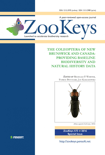
ZooKeys
Pioneering Research in the Heart of Biodiversity.ZooKeys, published by Pensoft Publishers, is a premier open access journal dedicated to all aspects of zoology and related biological disciplines. Since its inception in 2008, ZooKeys has emerged as a leading platform in the field, consistently showcasing groundbreaking research that spans diverse areas including animal science, ecology, and paleontology. With an impressive impact factor and categorized in the Q1 quartile for several categories such as Agricultural and Biological Sciences and Insect Science, the journal is recognized for its scholarly contributions, attracting researchers and professionals globally. Located in Sofia, Bulgaria, ZooKeys not only enhances the visibility of its publications through rigorous peer review but also ensures accessibility to vital findings, furthering academic discourse. As the journal continues to converge research efforts through 2024 and beyond, it remains an invaluable resource for students and academics aiming to stay at the forefront of zoological and ecological innovation.

Molecular Ecology Resources
Connecting Molecules to Ecosystems: Your Resource HubMolecular Ecology Resources, published by WILEY, is a leading international journal that specializes in the intersection of molecular biology with ecology and evolution. With an impressive impact factor signified by its Q1 status in multiple categories, including Biotechnology, Ecology, Evolution, Behavior and Systematics, and Genetics for 2023, this journal stands as a reputable source of groundbreaking research within the fields of agricultural and biological sciences. Its Scopus rankings are particularly noteworthy, placing it in the top tier of its respective categories, demonstrating its significance in advancing our understanding of molecular ecology. The journal has been committed to fostering high-quality scientific discourse from 2008 to 2024 and offers open access options to enhance its visibility and accessibility. As a researcher, professional, or student in these dynamic fields, engaging with Molecular Ecology Resources means contributing to and staying informed about the latest innovations and methodologies that shape our understanding of the biological world.
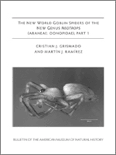
BULLETIN OF THE AMERICAN MUSEUM OF NATURAL HISTORY
Driving ecological discovery with peer-reviewed insights.BULLETIN OF THE AMERICAN MUSEUM OF NATURAL HISTORY, published by the American Museum of Natural History, represents a cornerstone of scholarly communication in the fields of Agricultural and Biological Sciences and Ecology. With an impressive impact factor highlighted by its Q1 quartile rankings in both categories, the journal publishes high-quality, peer-reviewed research that significantly contributes to the understanding of natural history. Researchers will find this journal indispensable as it covers a diverse range of topics, providing insights that drive ecological research and biological discovery forward. Although not open access, the Bulletin is widely available through institutional subscriptions, making it accessible to both established professionals and students eager to stay informed about the latest advancements in the field. Its commitment to advancing knowledge from 1996 to the present ensures that it remains relevant and highly regarded within the scientific community.

Bulletin de la Societe Linneenne de Lyon
Championing Original Research in Natural SciencesBulletin de la Societe Linneenne de Lyon is a distinguished journal in the field of natural sciences, published by Société Linneenne de Lyon, a renowned institution in the heart of France. This journal, bearing the ISSN 2554-5280, serves as a crucial platform for the dissemination of high-quality research articles, reviews, and discussions that focus on the diversity of life and its conservation, reflecting the foundational principles established by Carl Linnaeus. Although it operates under a traditional access model, the bulletin significantly contributes to the advancement of botany, zoology, and ecology by providing a forum for original research that often garners attention from scholars and practitioners alike. With a commitment to fostering collaboration and dialogue among researchers, this journal is positioned as a vital resource for anyone dedicated to understanding the complexities of biological sciences and systems. The impact of its publications is amplified by its ties to a prominent academic community, making it an essential read for professionals, researchers, and students eager to stay informed on the latest developments in their fields.

North-Western Journal of Zoology
Fostering Insights in Animal Biology and EcologyNorth-Western Journal of Zoology is a prominent scholarly publication dedicated to the field of zoology, fostering a vibrant exchange of research findings and insights among scientists, professionals, and students. Published by UNIV ORADEA PUBL HOUSE in Romania, this journal has been a reliable source for advancing knowledge in Animal Science and Zoology since its inception in 2008, with its publications spanning until 2024. With an engaging focus on innovative research and review articles, the journal proudly holds a Q3 quartile ranking in its category for 2023, positioning itself within the competitive landscape of Scopus Ranks. Although currently lacking an open-access model, the journal provides a valuable platform for disseminating critical findings essential to understanding animal biology and ecology. Researchers contributing to this journal benefit from a dedicated readership, furthering the discussion and practical applications of their work in diverse contexts.